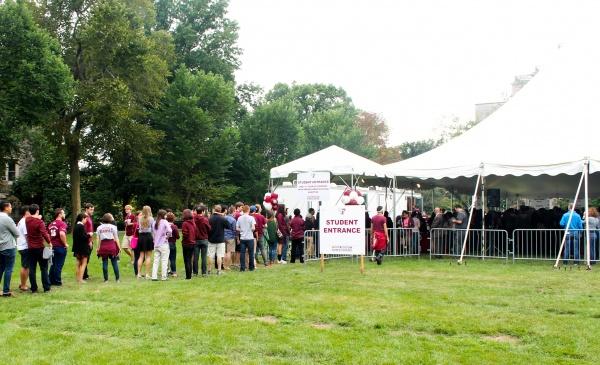Beer Sales: A Hot Topic at College Football Games
As more and more colleges begin to sell beer at football games, questions are being asked about whether the benefits outweigh the risks. (KIRSTIN BUNKLEY/ THE OBSERVER)
November 7, 2015
The recent New York Times article “Beer Here! Beer Here?,” written by Marc Tracy, addressed the pros and cons of beer sales at college games. Tracy noted a number of universities, such as the University of West Virginia, Syracuse University and Louisville University, that sell beer at college games. According to Mary Cunneen, Associate Director of Athletics for Facilities/Event Management, Fordham does not regularly sell alcohol at home games. Beer is offered underneath the tent at the homecoming game each year.
Meg Smith, Gabelli School of Business at Lincoln Center (GSBLC) ’19, an avid football fan, said, “College football and beer go hand in hand with each other. There is almost an expectation that there is beer at a college football game.” Smith went on to say that just because beer is sold at college football games, and underneath the tent at homecoming, doesn’t mean that all college students will drink it. Smith continued, “It is completely up to the individual to make that sort of decision.”
Shirina Braun, Fordham College at Lincoln Center (FCLC) ’19, believes that colleges and Fordham should not sell beer at football games. “Alcohol can easily be abused,” Braun said. “If people are going to be exposed to alcohol at school events, it just makes it more accessible for abuse.”
From a business standpoint, beer sales are a big pro for college games. Economically, beer sales can bring in thousands of dollars a year that will benefit athletic departments. The University of West Virginia made $500,000 from beer sales in one year alone. This extra money can be used to improve resources for athletes as well as the fan experience. Tracy said, “In an era of seven-figure coaching salaries and demands for more resources for athletes, universities are always looking for ways to increase revenue.” If college athletics are primarily concerned with making money, then selling beer is an extremely successful way to go about it.
From a moral standpoint, beer sales can be controversial in part because of the alcohol problem faced by many colleges. Binge drinking amongst college students is an increasing problem. According to the National Institute on Alcohol Abuse and Alcoholism, four out of every five college students will drink alcohol, and about half of the students who drink will binge drink. Tracy noted that a student at the University of West Virginia died of alcohol poisoning last year, yet alcohol is still sold on game days at the university.
There are both pros and cons to selling beer at college football games. Tracy noted both the success and risk that it imposed on other schools. Economically speaking, Fordham, and universities in general, can benefit greatly from selling beer; however, selling alcohol at colleges also imposes dangers for students.













